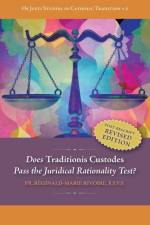av Fr. Réginald-Marie Rivoire
181
On July 16, 2021, Pope Francis published Traditionis Custodes, an apostolic letter that aimed at a drastic reduction of the use of the traditional Roman liturgy. In a letter to the bishops published on the same day, the pope explained at length the reasons for his decision. The harsh measures, in tandem with the violent and accusatory tone of the accompanying letter, have aroused consternation among the faithful who are attached to the usus antiquior. The Responsa ad Dubia issued in December of 2021 by the Congregation for Divine Worship and the Discipline of the Sacraments, so far from clarifying matters, only intensified the growing dismay and debate.The inaccuracies, difficulties of interpretation, and problems of concrete application of Traditionis Custodes have meanwhile raised many questions among canonists, pastors, and institutes whose proper law binds them to the liturgical forms of the Latin tradition. The present tract, written by canon lawyer Fr. Réginald-Marie Rivoire, F.S.V.F., undertakes a careful canonical reading of these documents, chiefly from the point of view of their juridical rationality. It is well known that rationality is one of the essential characteristics of a legal norm, such that strictly speaking, an irrational norm is not a norm and does not bind.The tract first considers the legal status of the documents; then, the affirmation at the heart of this whole legal apparatus and its raison d'être, namely, that the liturgical books promulgated by Paul VI and John Paul II are the sole expression of the lex orandi of the Roman Rite; and finally, the way in which numerous fundamental principles and precepts of canon law are undermined by the new norms.***The revised edition includes a 10-page addendum on (among other things) the implications of the "Rescript" released by Cardinal Roche on February 20, 2023.

